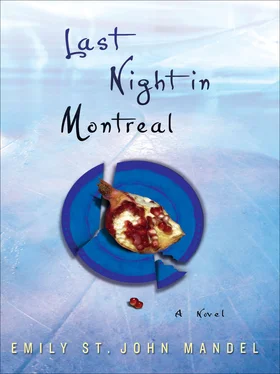She talked about languages sometimes near morning. Specifically, what it was like to speak the wrong one in a place where the use of a particular language is enforced by means of a tip line for citizen informants. Laws were in place in the province of Quebec to ensure the usage of French, agencies were set up to enforce them, and a 1-800 number connected callers to La commission de protection de la langue français to report violations. A violation could be as small as English appearing before French on a sign, she said, or the English appearing in larger letters, or a salesgirl saying hello instead of bonjour on a Sunday afternoon in the ladies’ shoe department. Penalties included fines and the revocation of business licenses.
“Try to imagine,” she said, “what it’s like when you can’t speak the right language in a place like this.” She had been explaining a graffiti tag they’d walked by near Club Electrolite: Montreal en français: 101 ou 401. Bill 101 was one of the laws that specifically restricts the use of the English language. The 401 was the highway out of the city. Speak French or get out.
“I know,” he said gently, “but did I ever tell you about my field of study?”
She went silent, noncommittal, tracing tightropish lines with one finger in the fog of a café windowpane. Outside the streets were achingly cold, and he felt it through the windows; Eli held his coffee mug with both hands to keep warm. It was almost four A.M.
“There are six thousand languages spoken on this earth,” he said. “I told you that much, right?”
She wrote a slow, looping 6,000 in the windowpane fog without looking at him.
“And the thing is, almost all of them will disappear.”
She seemed to like this idea; she smiled, stopped writing on the windowpane and sipped her newest cup of tea, gazed out the window at the huddled pedestrians, didn’t speak again for quite a while. The thought of disappearing languages seemed to make her happy.
“I found a new alleyway the other day,” she said finally. “Well, the same alleyway, but another spot farther down.”
“The one where I met you?”
“No. A different one.”
“I wish you wouldn’t.”
“Why not?”
“It’s dangerous. Why do you walk on tightropes?”
“It’s as close as I can get to all that. .” And all that, at that moment in that café in that cold northern city, was the time that she could almost see and almost remember, genetic memory planted long before her birth: an imagined life spent traveling through small towns with lions and tents and tightropes and sideshows, a long line of trailers winding down the highway between fields and trees, sunlight glinting on windshields; setting up tents in the field, the parking lot, the smell of popcorn and candy apples.
“You’ve traveled?” she asked.
“A little. Yes. I’ve been to Europe a few times with my brother. Spain, Paris, Eastern Europe, Turkey, one time we traveled around a bit in southern Italy.”
“The time with the boat?”
“I told you about that trip?”
“No, Lilia did.”
“Oh,” he said. “Yes. The time with the boat. She liked that story. We were fishing for squids.”
“Did you catch any?”
“No.”
“I dated a guy once,” she said, “who’d traveled around Europe a lot, and he said eventually everywhere seemed kind of interchangeable. Is it like that? When you travel, do all the places seem the same?”
How deep in our genes is the longing for flight embedded? We always were a species of nomads. Eli found it easy to imagine an instinct passed down generation to generation, a permanently thrown breaker on a genetic switchboard: flight or fight, and a switch jammed permanently in the flight position, the limitless longing for travel pulled down by hooked genes. It leapfrogs a generation (she said her parents had wanted to be a detective and a real estate agent, even when they were kids), and is thwarted when it reappears. She leaned across the table, asked him if it was true that all places look the same, and the least unkind thing he could do at that moment was nod and lie to her. Yes. It’s true. I have been to half-a-dozen countries, and all the world looks the same to me. He thought it would be unimaginably cruel to tell her that all of the individual places she hadn’t seen were different.
“I don’t believe you,” she answered, settling back in her chair, the moment passed.
In the spring when Lilia was fifteen she was traveling north out of Florida. It had been two years since the Unsolved Cases feature, and her life was played out in a shifting, paranoid landscape: abandoned meals on restaurant tables, impressions of figures passing just out of sight, an old blue car with Quebec license plates that she saw three times in different places, a constant feeling of being watched from behind.
There was no sense in talking about it. At some point that year, by unspoken agreement, she had stopped hiding in the back of the car. She was getting too big to comfortably disappear into the backseat of an automobile anyway, and there was a feeling of waiting for something inevitable to occur; her father was moving her faster and faster from place to place. By that frenzied summer they were in a different motel room every night. Sometimes they’d check into one motel, pay for two nights, and then drive to another a few miles away. Sometimes they’d sleep through the day and then drive all through the night, speaking softly or sitting together in silence, listening to night radio, hypnotized by headlights, three A.M. meals in the hallucinogenic glare of open-all-night restaurants on the interstate, going to bed near morning in a cheap motel with parking around back. She dyed her hair at least every month, from blond to dark brown and back again, across entire spectrums of auburns and reds, forever covering the trail. Lilia’s hair felt dry and soft to the touch, and her scalp was always itchy; she spent an hour at a time in the motel shower, soothed by the water, massaging conditioner into her head. She wore dark glasses during the daytime, a baseball cap pulled down low. She met no one’s eyes in public. She wanted gazes to pass over her without stopping. She wanted to be forgotten.
That was the spring she crossed into Arizona for the one hundredth time and had her first glass of red wine to celebrate. It was possibly the worst thing she’d ever tasted, but her father told her that all the best tastes in life are acquired, and she liked the way the liquid in the glass caught the light. That night her father woke her at two in the morning, not for any reason that he could articulate, and they were gone by two-twenty. On the highway she tried to go back to sleep, but couldn’t; she sat awake, wired and anxious, into the morning and all through the afternoon, until finally on the other side of the state her father pulled into the parking lot of the Stillspell Motel. She had a dull pounding headache from sleeplessness and the half glass of wine.
“Here,” he said. “I can’t drive anymore. Let’s get some rest.” He was haggard in the sunlight, hollow-eyed. In the motel room he went to bed and slept for three hours while Lilia read newsmagazines at the fake-wood table in the lamplight. He was breathing almost silently. She kept reading the same paragraph over and over again, looking over at him in the dimness to make sure she could still see his chest moving. She had never been so tired, but when she lay on the other bed a few feet away from him, there was a strange feeling of responsibility; for the first time in her life, she felt that she had to stay awake so he could sleep. Three or four cars pulled into the parking lot, and every single time she went to the window, but none of them were the blue car with foreign license plates. After a while she got out her camera and stood by the window taking photographs of the parking lot in the late-afternoon light to calm herself.
Читать дальше












